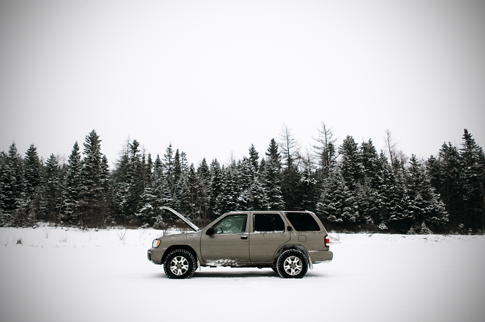What to do if your car breaks down?

Having trouble starting your car? Your alternator gave out in the middle of a trip? The engine is overheating? Here are the steps to effectively and, above all, safely handle a breakdown.
In the event of a breakdown: safety first!
If a breakdown happens while you're driving, get your vehicle out of traffic and make yourself visible. Immediately turn on your hazard lights and get off at the next exit if you can; if this isn’t possible, pull over as far to the right as you can on the shoulder. If necessary, place flares behind your vehicle. You can raise the hood to indicate that you need assistance. If there’s a danger of other vehicles colliding with yours, leave your car and find a safer place; always exit from the passenger side. Otherwise, it’s best to stay in your vehicle with your seat belt fastened and wait for help to arrive, especially if you’re stuck on a very busy road. If you’re travelling with children, lock the doors to prevent them from leaving the car and make sure they stay warm using the blanket from your emergency kit, if necessary. Stay calm and speak softly to reassure them.
Roadside assistance and towing: how-to
If your vehicle is stalled on a bridge, in a tunnel or on a busy thoroughfare, the safest place is inside your car: stay there! First contact 911 so that a patrol car can be dispatched to secure the area. Once you’re safe from danger, contact CAA-Quebec’s Roadside Assistance service or another emergency road service. If you have a mobile phone, you can make the call from your car. Otherwise, ask a passerby to make the call for you, but never get in a stranger’s vehicle, even if they offer to drive you to the nearest phone. You’ll need to provide the dispatcher with the following information: your name, the model of your vehicle, the nature and location of the breakdown, your licence plate number and a phone number where you can be reached easily. find out when the tow truck will arrive. The assistance service should be able to provide you with an estimated time of arrival based on the weather conditions and the breakdown location. When the tow truck arrives, make sure it’s actually from the assistance service you called.

Pay attention so you can describe where you are if your car breaks down
In a breakdown situation, the information you provide will make it easier for the patroller to troubleshoot and bring the appropriate equipment. Note reference points (streets, intersections), as well as on-ramp and exit numbers if you’re on the highway. This information alone could be very helpful if you have to call an emergency road service. Keep in mind that navigation systems can malfunction and don’t always work optimally in remote areas.
Maintaining and checking your car to prevent breakdowns
Breakdowns can happen to anyone, but there are some steps you can take to minimize the risks. First, be sure to properly maintain your vehicle, especially during winter cold spells. In addition, be aware of the condition of your car and pay attention to unusual noises, as well as any warning lights that may be flashing on the dashboard. Make sure you have at least a quarter tank of gas at all times and note any changes in engine temperature or handling. If you have any doubts, contact your mechanic.
Emergency kit: a must for your car, especially in cold weather!
Put together an emergency kit to keep in your car at all times. It should contain a flashlight, some basic tools, a reusable water bottle that you fill before leaving, a first-aid kit and a blanket. These items will be useful if you have to wait for a towing service to arrive. In cold weather, be sure to have a winter emergency kit and never leave without some spare clothes (socks, mittens, warm sweater, tuque, and so on), especially if you’re travelling with children.

Benefit from personalized advice
Do you have questions about gas-powered or electric vehicles, driving, or need recommendations to find an Approved Auto Repair Service?